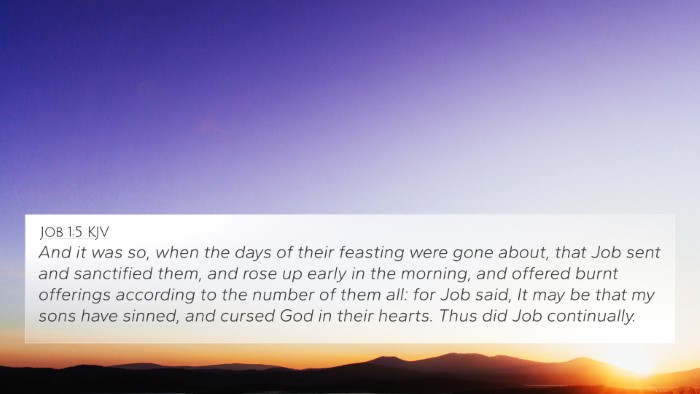Old Testament
Genesis Exodus Leviticus Numbers Deuteronomy Joshua Judges Ruth 1 Samuel 2 Samuel 1 Kings 2 Kings 1 Chronicles 2 Chronicles Ezra Nehemiah Esther Job Psalms Proverbs Ecclesiastes Song of Solomon Isaiah Jeremiah Lamentations Ezekiel Daniel Hosea Joel Amos Obadiah Jonah Micah Nahum Habakkuk Zephaniah Haggai Zechariah MalachiJob 3:25 Similar Verses
Job 3:25 Cross References
For the thing which I greatly feared is come upon me, and that which I was afraid of is come unto me.
Uncover the Rich Themes and Topics of This Bible Verse
Listed below are the Bible themes associated with Job 3:25. We invite you to explore each theme to gain deeper insights into the Scriptures.
Job 3:25 Cross Reference Verses
This section features a detailed cross-reference designed to enrich your understanding of the Scriptures. Below, you will find carefully selected verses that echo the themes and teachings related to Job 3:25 KJV. Click on any image to explore detailed analyses of related Bible verses and uncover deeper theological insights.

Job 1:5 (KJV) »
And it was so, when the days of their feasting were gone about, that Job sent and sanctified them, and rose up early in the morning, and offered burnt offerings according to the number of them all: for Job said, It may be that my sons have sinned, and cursed God in their hearts. Thus did Job continually.

Job 31:23 (KJV) »
For destruction from God was a terror to me, and by reason of his highness I could not endure.

Job 30:15 (KJV) »
Terrors are turned upon me: they pursue my soul as the wind: and my welfare passeth away as a cloud.
Job 3:25 Verse Analysis and Similar Verses
Understanding Job 3:25
Job 3:25: “For the thing which I greatly feared is come upon me, and that which I was afraid of is come unto me.”
This verse captures the essence of Job's emotional turmoil and dread as he contemplates the suffering he has endured. It reflects a profound connection between fear and reality, highlighting the psychological struggle that often accompanies human suffering.
Commentary Insights
Several public domain commentators offer valuable insights into this verse:
-
Matthew Henry:
Henry notes that Job’s fear wasn't merely a passing emotion; it was a deep-seated concern that he held in his heart. Job recognized that his fear had manifested into reality, indicating that our thoughts and fears can shape our experiences. Henry emphasizes that every man may have his fears become realities, reminding us to guard our hearts and minds.
-
Albert Barnes:
Barnes discusses the universality of human fear and suggests that Job felt a sense of hopelessness. He interprets Job's lament as an expression of the futility that accompanies intense suffering. Job’s words serve as a lesson in recognizing that the very thing we dread can come to pass, underlining the importance of faith and trust in God during trials.
-
Adam Clarke:
Clarke explores the psychological dimension of Job’s statement. He infers that Job's fears were rooted in his understanding of the world and his relationship with God. Clarke suggests that Job's lament relates to the aspect of spiritual warfare—where the mind battles against the potential realities of suffering and despair. He also emphasizes the relevance of mindfulness in one's spiritual life.
Theme of Fear and Reality
The themes of fear and the resulting consequences loom large in Job's lament. Job illustrates a spiritual truth: what one fears can come to fruition, often exacerbating our suffering. This idea resonates throughout Scripture, where various passages warn against living in fear.
Cross-Referencing Biblical Texts
Job 3:25 connects with several other Bible verses, illustrating the thematic ties between fear, suffering, and divine providence. Below are notable references:
- Proverbs 10:24: “The fear of the wicked, it shall come upon him: but the desire of the righteous shall be granted.”
- Isaiah 41:10: “Fear thou not; for I am with thee: be not dismayed; for I am thy God: I will strengthen thee; yea, I will help thee.”
- Matthew 6:25: “Therefore I say unto you, Take no thought for your life, what ye shall eat, or what ye shall drink; nor yet for your body, what ye shall put on.”
- 1 Peter 5:8: “Be sober, be vigilant; because your adversary the devil, as a roaring lion, walketh about, seeking whom he may devour.”
- Philippians 4:6-7: “Be careful for nothing; but in every thing by prayer and supplication with thanksgiving let your requests be made known unto God.”
- Psalm 27:1: “The Lord is my light and my salvation; whom shall I fear? the Lord is the strength of my life; of whom shall I be afraid?”
- Job 6:24: “Teach me, and I will hold my tongue: and cause me to understand wherein I have erred.”
Theological Implications
Job’s profound declaration speaks volumes about the nature of human experience in relation to divine sovereignty. This brings forth a crucial theological implication: while fear is natural, it should not govern our faith or actions. The interconnectedness between Job’s distress and the reassurances found in other scriptures serves as a reminder of God’s eternal presence and faithfulness amidst trials.
Applying the Insights
Understanding Job 3:25 provides an opportunity for deeper reflection on personal fears and their impact on our lives:
- Cultivating Faith: Remind oneself of God’s promises over fears.
- Seeking Community: Sharing fears within a trusted community can aid spiritual healing.
- Engaging in Prayer: Seek God’s guidance through prayer in times of distress.
Conclusion
Job 3:25 serves as a poignant reminder of the intertwining of fear and reality. By exploring the commentaries and connecting cross-references, readers gain insights not only into Job's suffering but also the enduring hope faith offers through life's challenges. This verse and its connections highlight the importance of maintaining our minds and hearts anchored in God's truth, urging us to overcome fear with faith.


